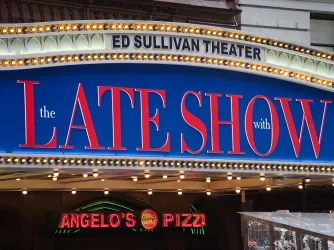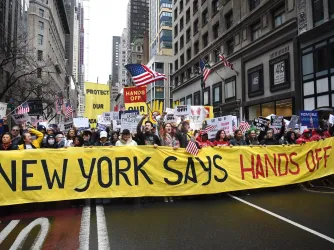Table of Contents
Do the cops suing Afroman after raiding his home have a case?

Nathan Papes / Springfield News-Leader / USA TODAY NETWORK
Hip-hop/rap artist Joseph Foreman, who's better known by his stage name Afroman, talks to the Springfield News-Leader at a recording studio on Tuesday, Dec. 13, 2022.
A year after raiding Grammy-nominated rapper and 2024 presidential candidate Afroman’s home and finding no evidence of criminal activity, Ohio police officers are now suing him for making fun of them.
Last August, seven officers executed a search warrant on Afroman’s Adams County residence on suspicion of drug trafficking and kidnapping. The rapper (whose real name is Joseph Foreman) wasn’t home during the raid, but his ex-wife — who lives nearby and went over with their kids when she noticed the police presence — filmed parts of it with her cell phone. Home security cameras also caught the officers in action, weapons drawn. In the following days, Afroman posted footage of the incident on his Instagram page.
“They come up here with AR-15, traumatize my kids, destroyed my property, kick in my door, rip up and destroy my camera system,” he said at the time.
In one clip that would serve as a source of creative inspiration, Afroman narrates surveillance footage of an officer appearing to do a double take at a lemon pound cake on the rapper’s kitchen counter. “He didn’t know whether to shoot me in my ass or cut him a slice of that good old country lemon pound cake,” the caption reads. “I ain’t mad at him i’m a big boy too.”
The search uncovered no criminal evidence, and no charges were filed. Adding to the drama, the sheriff’s office appeared to come up $400 short when it returned cash seized from Afroman’s home. An independent investigation by another sheriff’s office concluded the officers had overcounted the money when they seized it.
Afroman has no idea what made the police think he was kidnapping anyone. In one Instagram post, he wrote:
KIDNAPPING????????? 😂😂😂😂😂I’m too lazy to kidnap anything. I will kidnap a blunt, I will kidnap a bottle of Colt 45, if you look the wrong direction I will kidnap your hamburger 😂😂😂 Who did I kidnap? . . . Women bring me their breast and their phone numbers I don’t kidnap people. . . . However I have video tape footage of them stealing my money. I have video tape footage of them destroying my property. I have video tape footage of them trying to disconnect my video cameras. I have video footage of them actually disconnecting my video tape footage.
He told NPR he had nothing in his house but the ends of a few blunts and unused pipes that fans made for him. “I would have given that to them if they would have knocked.”

When life gives you lemons, make lemon pound cake
In the wake of the incident, Afroman did what he does best: make music. The rapper is best known for his early 2000s hit “Because I Got High.” In September, he released a new album, “Lemon Pound Cake,” that includes several songs about the raid.
“Mama’s lemon pound cake, it tastes so nice,” goes the chorus of the title track (to the tune of The Drifters’ “Under the Boardwalk”). “Make the sheriff wanna put down his gun, and cut him a slice.”
The album also features “The Police Raid” and “Will You Help Me Repair My Door.” (The door, by the way, has been auctioned off.) The accompanying music videos contain Afroman’s footage of the raid. He also created merchandise that depicts the officers and continued to criticize them on social media.

Now, some of those officers are suing him for invasion of privacy and profiting off the unauthorized use of their “images, likenesses, and distinctive appearances.” In a complaint filed on March 13, the officers claim Afroman’s use of footage and images of the raid in music videos, merchandise, and social media posts invaded their privacy and misappropriated their personas for commercial gain. The officers allege they suffered humiliation, ridicule, mental distress, loss of reputation, and death threats.
The complaint cites and links to the music videos and several of Afroman’s Instagram posts that have since been deleted, though posts similar to those described in the complaint remain up. For example, the complaint cites a post of Afroman wearing a shirt with an image of an officer beside Peter Griffin, a character from the animated television comedy “Family Guy.” That post is gone, but this one of the rapper wearing and promoting shirts featuring Peter Griffin, one of the officers, and a large lemon pound cake remains up. Similar shirts are also available in Afroman’s online store.
Another deleted post allegedly showed an officer next to an image of the Mona Lisa, with a caption that read in part:
Good Morning Ladies . . . here she is . . . The Condescending C?nt . . . ADAMS KKKOUNTY SHERIF LIEUTENANT MONA LICC'EM LOW LISA to serve and disconnect . . . (your home video security surveillance system) so you won’t have proof of the Adams county sheriff department stealing money and other things around your house even possibly planting false kidnapping evidence.
Other deleted posts allegedly promoted merchandise featuring the officers’ images or depicted Afroman or his fans wearing the merchandise, with captions promoting his new album (e.g., “What’s your favorite song on lemon pound cake so far?”) or upcoming tour.
A variety of other posts show names and/or images of the officers or footage of them searching Afroman’s home, alongside Afroman’s commentary criticizing their conduct or mocking them.

The (pretty weak) case against Afroman
To recap, several police officers raided a rapper’s home, found no evidence of criminal activity, and are now suing him because he used his own footage of the raid to criticize, ridicule, or otherwise comment on their actions. The lawsuit is not a good look.
“I was thinking, these big bad cops . . . are being beat up and bullied by those little corny rap songs I made about them,” Afroman said in reaction to the lawsuit. “I’m like, ‘Oh my god, are you letting me know that my raps are working on you?’”
To be clear, if the officers received death threats, that is reprehensible, and any person who threatened the officers will find no protection under the First Amendment. But Afroman made no such threat, nor did he encourage anyone else to make one.
Optics aside, do the officers have any chance of winning this lawsuit?
Let’s start with the claim that Afroman’s social media posts made statements that invaded the officers’ privacy by placing them in a false light before the public. To win on this claim, the officers must prove Afroman knew he was portraying the officers in a false light or acted with reckless disregard for the truth, and that the false portrayal would be highly offensive to a reasonable person.
The officers have an uphill battle. Afroman’s use of their images is infused with artistic expression, parody, and social commentary
The complaint does not identify any statements that placed the officers in a false light. It could refer to Afroman’s claim that the officers stole money from him. But the amount of money returned to Afroman was less than the amount the police initially said they seized. While an audit by a sheriff’s office from another county ultimately concluded the officers made an honest mistake, Afroman doesn’t buy it. The officers may have a tough time proving Afroman’s accusation was false and he knew — based on the results of a police investigation, at a time when he was not so trusting of the police — it was false or recklessly disregarded that possibility.
A ruling against Afroman here would be chilling. It would essentially mean he had no right to dispute the findings of a police department retained by another police department that just raided his house and found no evidence of crime.
Other statements Afroman made about the police damaging his property appear to be confirmed by the surveillance video. And his statements criticizing the officers, making unflattering comparisons to cartoon characters or celebrities (e.g., this post calling an officer “Sheriff Sam Sausage Head Eminem Elliott”), and otherwise insulting them are opinion and commentary protected by the First Amendment.
The officers also allege Afroman gave “unreasonable publicity” to the officers’ private lives, again without specifying which posts or statements did this. This is probably their weakest claim. The officers will have to prove that Afroman disclosed facts about their private lives that would be “highly offensive to a reasonable person” and “not of legitimate concern to the public.” An armed agent of the state executing a search warrant in the line of duty has no reasonable expectation of privacy, in case that wasn’t obvious.
In fact, the First Amendment protects the right to record the police as they perform their duties. As one federal court put it, “Gathering information about government officials in a form that can readily be disseminated to others serves a cardinal First Amendment interest in protecting and promoting ‘the free discussion of governmental affairs.’” Recordings of police officers’ interactions with civilians have revealed abuses and started national conversations about police reform.
Afroman also mentioned the officers’ names in his posts, but their names are a matter of public record, so that disclosure won’t support an invasion of privacy claim.

The officers’ remaining claims allege Afroman appropriated their personas for commercial gain without their permission. Ohio, like most states, recognizes a “right of publicity,” which gives people control over the use of their identities for commercial purposes. The archetypal example of a violation of the right to publicity is a company exploiting a celebrity’s fame for profit by using their name or image in an advertisement without their consent. Celebrities from Bette Midler to Kareem Abdul-Jabbar have sued companies for the unauthorized use of their identities in advertisements.
You don’t need to be a celebrity to bring a right of publicity claim, but you do need to show that the use of your identity has commercial value. As one Ohio court noted, the “tort's primary focus is the value of a person’s name, vis-à-vis his or her ability to market it for commercial purposes.”
The officers might argue that their images are precisely what give Afroman’s videos and merchandise commercial value: Fans want to wear the shirts because they depict and ridicule police officers who got on the wrong side of their musical hero. Not the most dignifying argument (“My identity has value as a source of mockery!”), but one that it seems the officers have to make.
Still, entertainment lawyer Barry Chase says the “factor that the courts really care the most about is are you invading a potential market that could be taken advantage of by the person or the work that is being distributed? Now, these cops don’t have a market for their images.” And the value of Afroman’s work and merchandise really derives from his fame and his creative expression and commentary about the officers’ actions, not their identities per se.
Afroman’s posts and merchandise — like his music videos — are expressive.
If the officers can get past that stumbling block, they will also have to deal with various exceptions in Ohio’s right of publicity statute. The statute’s prohibitions against unauthorized use don’t apply to audiovisual and musical works, material that has “political or newsworthy value,” any advertisement for these uses, or any use protected by the First Amendment (nor could it, as state law can never override the First Amendment). So Afroman’s songs, music videos, and social media posts promoting the videos or his album are in the clear. Afroman also has a viable argument that the statute doesn’t apply to any of his uses of the officers’ images because they all had newsworthy value as commentary on a police raid of a famous rapper’s home.
Even if the statute’s newsworthiness exception doesn’t save Afroman’s raid-inspired merchandise and social media posts promoting it, the officers still have to overcome the First Amendment. Ohio courts have noted the tension between the right of publicity and the First Amendment, recognizing that the “use of a person’s identity primarily for the purpose of communicating information or expressing ideas is not generally actionable as a violation of the person’s right of publicity.”
Afroman’s posts and merchandise — like his music videos — are expressive. The shirt designs and Instagram posts lampoon the officers, juxtaposing them with cartoon or movie characters and giving them unflattering nicknames. One federal court rejected a right of publicity claim brought against an online commentator who sold merchandise depicting a conspiracy theorist’s face on the rear end of an animal and on a cartoon body, because they were “parody images protected by the First Amendment.”
Many of Afroman’s posts also contain captions mocking or criticizing the officers. It’s all plausibly part of his commentary on what he believed to be police misconduct and incompetence.

Afroman is, of course, also seeking to make money off of the shirts, and he may be using the officers’ likenesses in part to promote his “brand.” But expressive material doesn’t lose constitutional protection just because it’s sold. The First Amendment torpedoed a right of publicity claim against an artist who created a painting of Tiger Woods in different poses at the 1997 Masters Tournament, even though the artist sold prints of the painting. It also protected trading cards featuring caricatures of Major League Baseball players and humorous commentary. And if Afroman’s use of the officers’ likenesses in his music, music videos, and merchandise is protected, his posts promoting those things are likely protected as well.
The officers have an uphill battle. Afroman’s use of their images is infused with artistic expression, parody, and social commentary, and the court may decide that those elements are what give his merchandise value, not the officers’ “distinctive appearances.”
Have we still learned nothing from Barbara Streisand?
On the Consumer Law & Policy Blog, attorney Paul Levy writes:
I also wondered whether the lawyer who filed this case, not to speak of his clients, had thought about whether the suit would simply bring even greater attention to the clients’ participation in the raid. To be sure, these plaintiffs have already taken more of a public beating than Streisand had when she filed her lawsuit.
Levy is referring to the famed “Streisand Effect,” which he notes is approaching its 20-year anniversary. In 2003, Barbara Streisand sued a photographer who took and posted online photos of the California coastline to document coastal erosion. Streisand wasn’t happy that one of the images showed her oceanfront home. Only six people had viewed the photo, but after news of the lawsuit, viewership spiked into the hundreds of thousands (and is still climbing to this day).
I don’t know how many people were walking around wearing “Officer Pound Cake” T-shirts before the police sued Afroman, but I’m willing to bet that number is way higher now.
Recent Articles
Get the latest free speech news and analysis from FIRE.

He refused to censor his syllabus — so Texas Tech cancelled his class

Fandom’s lighthouse in a sea of censorship

FIRE statement on Stephen Colbert’s James Talarico interview and continued FCC pressure


